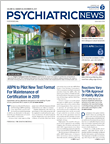The American Board of Psychiatry and Neurology (ABPN) is piloting a new open-book, journal article–based assessment beginning in 2019 as an alternative to the proctored 10-year Maintenance of Certification (MOC) examination.
(At press time, some aspects of the project were still in development; details outlined here are subject to change.)
Eligible diplomates who choose to participate in this pilot program will be required to read and answer questions on between 30 and 40 journal articles. Diplomates may choose from a library of articles that have been selected for the test by the ABPN Pilot Project Test Writing Committees. (These committees include nominated members from the ABPN, APA, the American Academy of Child and Adolescent Psychiatry, the American Academy of Neurology, and the Child Neurology Society.)
Articles will be accessed online through an ABPN portal, and diplomates may refer to the articles when answering questions. Once a mini-test is opened, all questions must be answered to receive credit before subsequent mini-tests can be accessed. To get credit for an article, at least four out of five questions must be answered on the first attempt. Articles and mini-tests can be completed in multiple sittings.
Diplomates who enroll in the program will be required to successfully complete the 30 articles and meet all other MOC requirements every three years to avoid being required to take the secure, proctored 10-year Part III exam.
The pilot project will begin for eligible ABPN diplomates in January 2019. Invitations will be mailed to them this month, and those who wish to participate must enroll in March 2018. The project will run for three years (2019 to 2021), after which a decision will be made concerning whether to make it a permanent alternative to the 10-year MOC examination.
Diplomates who are eligible to participate in the pilot program are those who are currently certified and who fall into one of two categories: those who have earned ABPN certification or who passed the MOC examination in the years 2012, 2013, or 2014 in psychiatry, child and adolescent psychiatry, neurology, or child neurology; or those whose certificate is expiring in 2019, 2020, or 2021 in psychiatry, child and adolescent psychiatry, neurology, or child neurology.
“The ABPN developed the pilot program in an effort to provide diplomates with a meaningful and relevant option to the 10-year MOC examination,” ABPN President and CEO Larry Faulkner, M.D., told Psychiatric News. “It is our hope that diplomates who participate in the pilot project will find that it helps them stay current with the knowledge they need to provide quality patient care.”
For those already paying the ABPN an annual fee as part of continuous MOC, there are no additional fees associated with the article-based test, though some articles may require diplomates to pay publisher fees for access to articles. Those in the 10-year MOC program will be required to pay the regular exam fee to participate in the pilot program.
APA leaders said that the open-book, article-based test option is an important step in making MOC more flexible.
“Requirements around Maintenance of Certification are among the most prominent concerns of our members, and many have been asking for an alternative to the 10-year, secure, proctored exam,” APA President Anita Everett, M.D., told Psychiatric News. “APA has been advocating for something similar to the open-book, journal article–based assessment, and we hope it provides an attractive option for members to consider.”
APA CEO and Medical Director Saul Levin, M.D., M.P.A., said the new program “provides more flexibility in terms of diplomates being able to select articles that are relevant to their own practice. It allows diplomates to read the articles and complete the test at their own pace.”
Of the recognized subspecialties for which the ABPN grants certification, only child and adolescent psychiatry will be part of the pilot project. The ABPN will work to make the journal article-based assessment system available for all its subspecialties as quickly as possible after completion of the pilot project in 2021. The ABPN plans to transition those diplomates who took psychiatry, child and adolescent psychiatry, neurology, or child neurology examinations in 2015 through 2018 into the new assessment system in 2022 pending approval by the American Board of Medical Specialties.
Lapsed and lifetime certificate holders will not be eligible to participate in the pilot project. ■
